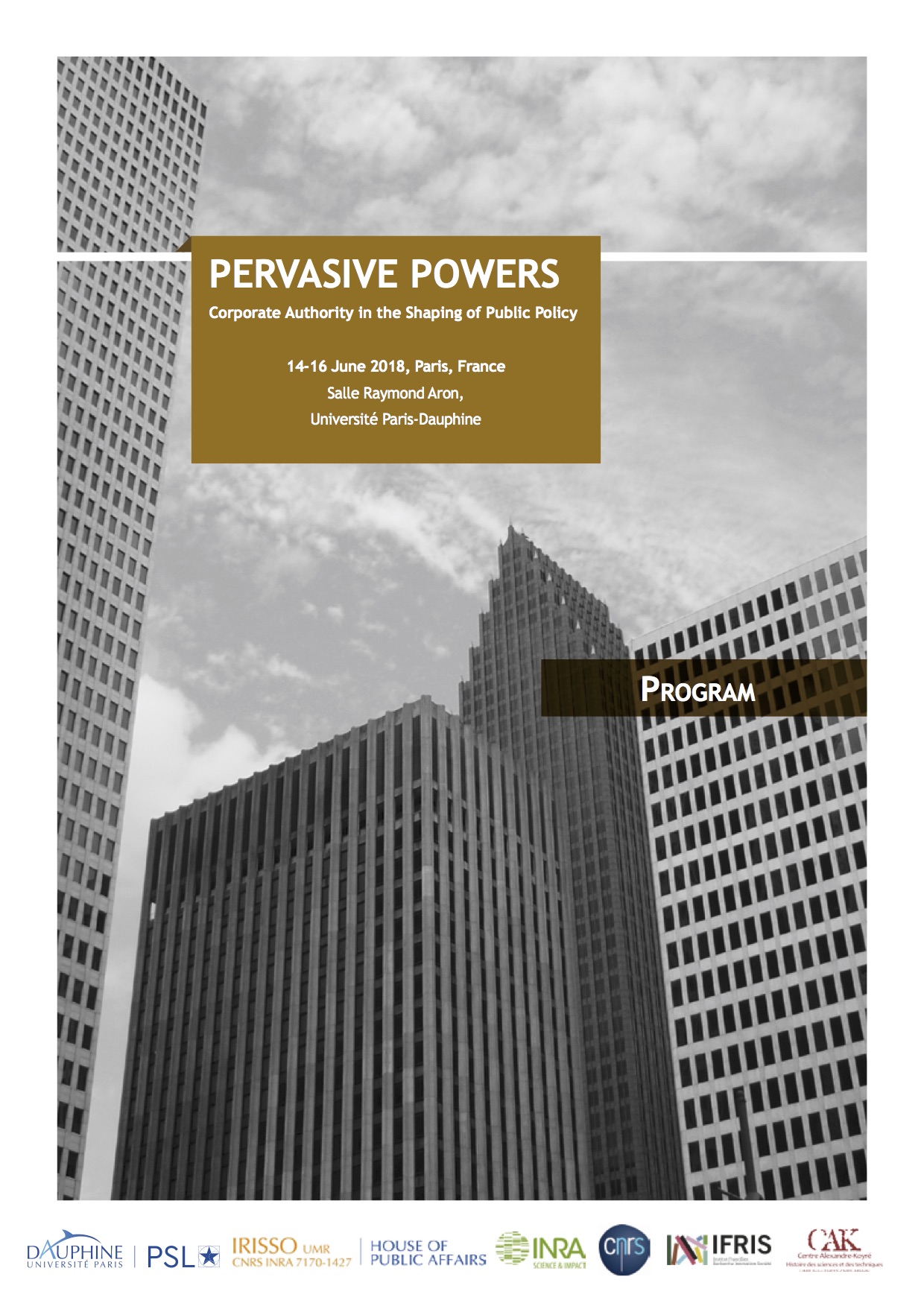
|
|
|
|
INTERNATIONAL CONFERENCE
Registration is now open. Please click here and fill the form in order to attend the conference. - To access the conference, please don’t forget to bring an id in case of security clearance by the university staff -
Full program and practical informations available by clicking below
PresentationThe power of corporate business has been a subject of intense debate and many social science studies since the 19th century. This conference is based on the idea that, not only has this power varied among industries, countries and different periods, but also that the way in which it is wielded has evolved over time. By bringing together scholars from various backgrounds within the fields of history, sociology, and political science, we intend to provide new insights on the multiplicity, depth and limits of the forms of influence that corporations, or the organizations furthering their interests – business associations, think tanks, communication or public relations agencies, foundations, etc. –, have on public policy. The role of corporate organizations in the shaping of public policy has been a classical subject of interest in sociology and political science. Since the seminal work of C. Wright Mills, Elmer E. Schattschneider, Peter Bachrach and Morton S. Baratz in the fifties and sixties, it has fuelled much research on the interactions between economic, administrative and political elites, on the production of decisions or “non-decisions”, and on inequalities of access to political power. Yet, although these issues have played a key part in the development of sociological and political science studies on issues of power, many of them no longer receive any attention, especially in public policy analysis. Two main reasons justify revived interest in these issues today. First, multiple reforms, often of neo-liberal inspiration, have undermined or even dismantled whole bodies of regulations, or have set up regulatory tools or instruments that clearly favour economic or financial interests. Some of these reforms have also facilitated the commodification of certain public services, or have strengthened international authorities that are biased towards promoting certain market mechanisms. These trends beg the question of how corporate organizations have contributed to such reforms, and on the benefits that they have derived from doing so. But what effects have the reforms additionally had on the promotion and representation of corporate interests in the public institution arena? How can the multiple forms of big business’ presence within these same institutions be characterized? To what extent do these trends, accompanied by ever greater demands for transparency, also result in more normative power in the hands or corporate authorities, while democratic forms of government are constantly being undermined? Second, the growth of new approaches such as research on the social production of ignorance, or on health and environmental justice, invite us to consider forms of action and influence of economic actors to whom researchers have paid scant attention until now. These streams of research are fostering interest in the ways in which corporate organizations can affect the production, interpretation and dissemination of certain knowledge, and how they facilitate certain forms of misunderstanding or ignorance on particular problems, thereby influencing the policies that are supposed to solve them. This – non-exhaustive – corpus of literature can be expected to afford greater insight into how corporate authority has contributed to the neoliberal turn in public policy. It should also account for certain corollary processes, such as changes in the types of knowledge used in public policy, the weakening of nation states in the definition of certain economic, social, sanitary and environmental policies, and the decline of democratic government as it makes way to more authoritarian ways of exercising power. If we are to understand the nature and modalities of corporate actors’ influence, it is important to examine how they are constituted in the various sectors (chemicals, agriculture, finance, energy, water, health, etc.) and at different scales: local, national and global. One of the aims of this conference will be not only to enable geographic or inter-sectoral comparisons, but also to obtain as complete a picture as possible of these pervasive powers.
Confirmed Conference SpeakersJohn Abraham (King’s College of London) Tim Bartley (Washington University in St. Louis) Eve Chiapello (EHESS/CEMS) Sophie Dubuisson-Quellier (CNRS/CSO) Dominique Pestre (EHESS) Dieter Plehwe (WZB) Ed Walker (UCLA)
Scientific Committee Sophie Dubuisson-Quellier (CNRS/CSO), Scott Frickel (Brown University), Mathias Girel (ENS/Caphes), Linsey McGoey (Sussex University), Sezin Topçu (CNRS/CEMS)
Organizing Committee Sara Aguiton(CNRS/CAK), Marc-Olivier Déplaude (INRA/IRISSO), Emmanuel Henry (Université Paris Dauphine/IRISSO), Nathalie Jas (INRA/IRISSO), and Valentin Thomas (Université Paris Dauphine/IRISSO).
For any enquiries, please contact: pervasivepowers.conference@gmail.com
This conference is supported by the research programs ProPublics and SHS-ENV (funded by PSL Research University), the House of Public Affairs (Université Paris-Dauphine), and the IFRIS. |


